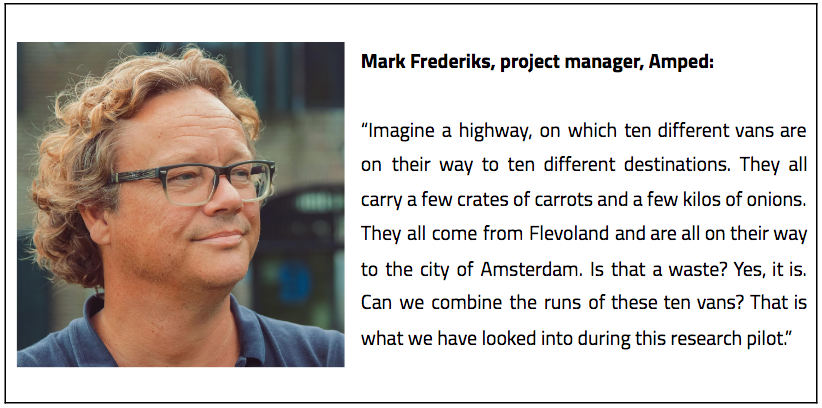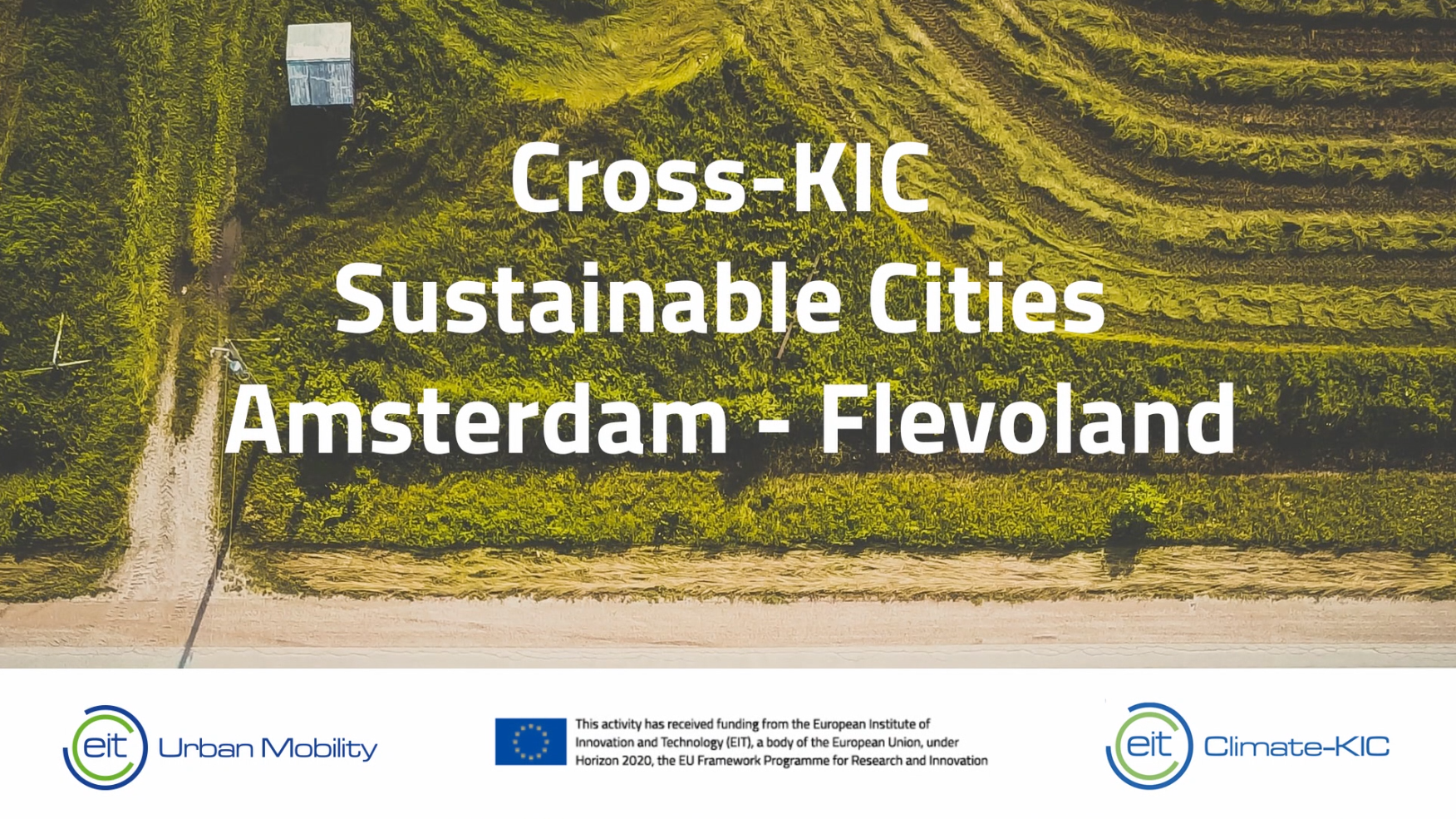Capitalizing on collaboration – shortening the food chain
How do we get more Flevoland produce into the city of Amsterdam?
The recent interest of consumers in organic and/or local food is real and has encouraged various types of incentives and commitments in the Netherlands. However, local food distribution systems are generally underdeveloped and therefore fail when compared to global food distribution systems. Consequently, local farmers and their products cannot compete on price with food from the global market. In the context of Flevoland – one of the most fertile arable pieces of land in the world – that is a real shame. Therefore, a consortium of short food supply chain partners has teamed up to find out: how can we get more Flevoland food into the city of Amsterdam? Does it help if different short supply chain initiatives work together and collaborate in their logistics? This longread presents the results of the first pilot: creating a regional food hub.


Short food supply chains on the rise
Rapid urbanization, and the associated increased demand for food, strains existing urban infrastructure and the environment in multiple ways. Localizing urban food supply chains is a necessary prerequisite for achieving carbon neutral and circular cities, but the highly specialized nature of global food supply chains means that it is often more cost-effective to send food to faraway places then to feed your own fellow citizens. This is the case in Flevoland, one of the world’s more productive agricultural regions located on the outskirts of Amsterdam. Flevoland’s produce ends up at grocery shelves all around the world, but not in its neighbouring cities. Strengthening local food chains will not only help decrease carbon emissions, but also provide a better income for farmers.
Cross-KIC: capitalizing on collaboration
Short food chains are often set up with the intention of reducing CO2 emissions. But in practice, short food chains can become the cause of even more logistical movements in and around the city. In recent years, various entrepreneurs have gained practical knowledge about clean and efficient logistics in the short chain. Research institutions are also strengthening the knowledge on innovative low carbon city logistics. Combining this knowledge and facilitating cooperation between academia and practitioners can lead to a breakthrough in setting up sustainable, regional food systems. In this Cross-KIC supported research pilot, 10+ partners including research partners, entrepreneurs and farmers’ organizations, have teamed up to shorten the food supply chain in the Flevoland region, in order to build a better case for farmers, all while decreasing the carbon footprint of food transportation in Amsterdam.
About the pilot: testing a regional food hub
Capitalizing on Collaboration was one of the winning proposals of the Cross KIC Sustainable Cities’ call for proposals 2020. In this research project, led by Amped and Eindhoven University of Technology, we have analysed and mapped the Flevoland-Amsterdam ecosystem to understand key issues related to the short food supply chain (SFSC) and find innovative solutions to overcome limitations faced by small and mid-sized farms. We expected that establishing a regional food hub would have great potential in this matter by managing the aggregation, distribution, and marketing of source-identified food products from local and regional producers. The research consortium therefore joined forces with key SFSC stakeholders to run a pilot with a food hub in place, with low emission vehicles running an optimized milk run, with near-full haul loads and with a multi-market strategy for last-mile delivery.
Currently, each individual SFSC initiative has its own target customer group, its own revenue model, its own value proposition. Already on an individual level these initiatives are able to offer a better price to farmers, but they have reached an impasse in terms of impact in terms of volume. To increase that impact, they need to collaborate, and what they all share is a logistics system. In this research project, we have looked at ways to combine these systems.
Our research process consisted of several parts:
- Desk research: through desk research we identified existing data and information, complemented with key-informant interviews, to put forward the most up-to-date knowledge on context-specific reasons why transportation and logistics are barriers for Flevoland farmers who want to supply the Amsterdam Metropole Region. We concluded that there are many parallel runs and missed opportunities for collaboration (and thus unnecessary costs). Our findings can be read in the System Mapping Report
- Life Cycle Assessments (LCA): the LCA is used as a comparison tool between the current state of the food supply chains and the post-intervention state. These include: (i) the infrastructure along the supply chain; (ii) the type (capacity) of vehicles used; (iii) the conditions in which food is transported, stored (e.g., refrigerators, freezers, etc.) and packaging material usage.
- Innovation ideation workshop: the ideation workshop acts as a bridge between the system mapping phase (a more conceptual exercise) to the pilot project (a practical intervention in the supply chain). The workshop helped align our expectations, and pinpoint with more accuracy what we can actually achieve within the scope of this project and where to focus our energy going forward.
As a result of the research process we determined that the following supply chain innovations are necessary:
- A regional Food Hub, the most important innovation, in order to overcome several logistical and transportation issues faced by consortium partners. The regional Food Hub would create a basic re-orientation of logistics systems that will enable current SFSC initiatives to go to the next level in terms of collaboration, revenue and volume, paving the path for 20% of food in Amsterdam coming from Flevoland.
- Multimodal transportation can potentially increase fuel and cost efficiencies and improve the sustainability of regional food distribution by reducing reliance on truck transportation. Multimodal transportation is fledgling as a real alternative to the well-established truck freight transportation system, but one worth exploring in light of increasing complications associated with truck transportation and a growing interest in creative logistics. Barges are particularly interesting in the Flevoland-Amsterdam context because of the abundance of waterways connecting the two regions.
- Third party logistics (3PL), a supply chain model in which one entity provides packaging, warehousing, inventory management, marketing and transportation services, would be a welcome addition to the Flevoland-Amsterdam supply chain. In the area of SFSC specifically, a 3PL provider could be of crucial importance due to the fact that development of efficient SFSC is very sensitive regarding data sharing and arranging joint logistics. In our pilot, Local2Local (one of the consortium partners) has functioned as this 3PL provider and has coordinated the several logistical processes between the SFSC initiatives.
- Shared smart software: having one shared IT platform for managing all information would be beneficial to everybody along the supply chain. Democratizing IT is deemed essential: this shared IT platform would offer basic services to everybody along the supply chain in order to standardize information sharing. Digitizing transactional information would also nullify transaction costs, which can be the secret killer of SFSC economic viability. During the pilot, Food Distribution Software of Local2Local was used.
Pilot run: In the Pilot Project we sought to optimize the parallel transport streams from different SFSC entrepreneurs in Flevoland, to test the potential for optimized logistics when a regional food hub is in place. The pilot was a one-time experiment to get an idea of the potential for improvement in the future. Below is a stylized version of the pilot run we realized. For a detailed overview of the pilot, including a description of the previous described innovations and SFSC initiatives that were involved in the pilot, please see the Innovation pilot report.
See what happened during the pilot
Outcomes and recommendations: what do we need?
In terms of CO2 and cost reductions, the pilot has proven to be a success. In terms of cost, combining the logistics of different SFSC initiatives has resulted in great savings. In the pre-pilot situation (and in short food supply chains in general), logistical costs of these initiatives make up between 40 to 60 percent of the total costs. The pilot, in which their logistics were combined, has shown a potential reduction of 13 percent of logistics costs. See figure below.

Compared to the pre-pilot situation, the combined supply chain that was tested in the pilot also resulted in a 33 percent reduction of CO2 emissions. When a regional food hub is in place, CO2 reductions can go up to 65 percent (see figure below).

Thanks to the pilot run we have conducted in this research project, we have learnt a lot about potential improvements for a short food supply chain between Flevoland and Amsterdam. The improvements can be summarized as: 1) reduced food miles by individual farmers; 2) reduced CO2 emissions thanks to increased haul load; 3) access to new markets.
So what do we need in order to strengthen the short food supply chain? And how do we achieve these improvements in a sustainable way?
Capitalizing on collaboration? Yes!
Transitioning to local food production is a daunting task, and the world needs successful case studies to get this transition started. This project has focused on creating a food hub as a way to shorten the food supply chain from Flevoland to Amsterdam. Through a pilot with the main stakeholders, we have managed to optimize transportation and logistic processes within the short food supply chain between Flevoland and Amsterdam. Thanks to collaboration between several existing SFSC initiatives in Flevoland, impressive CO2 emission reduction and cost reduction were achieved. At the same time, a fair and attractive business model for farmers was developed. This pilot has resulted in a Blueprint of what a dedicated SFSC Flevoland Food Hub, capable of handling large volumes from a variety of producers, and delivery to a variety of consumers, should look like.
The long-term goals for the development of this Regional Food Hub are to provide 20-25% of Amsterdam’s food needs from Flevoland in 2030 by creating a network of regional food hubs to enable pooled inventory. In order to achieve these long-term goals a layered approach is needed, by building collaborations between different interconnected layers. The willingness to collaborate starts with practically working together to find solutions (practical layer), synergies develop by connecting activities (tactical layer), in order to collectively build systemic solutions based on shared values (strategic layer).
- Practically, we will bundle sales and logistics solutions of the various parties via the short chain with various organizations.
- Tactically, we will investigate how existing concepts and activities can fit together and reinforce each other. We must make an exploratory inventory of the activities within the various organizations. Part of this is also forming an alliance of front runners: the Amsterdam Short Chain Alliance.
- Strategically, our ultimate goal is to cause system change by tackling systemic problems from a shared vision, providing a joint roadmap in which cross-sectoral connections are leading.
We want to raise the bar for the degree of mutualism in regional food supply chains by showing that collaboration across and along supply chains, involving various actor types, is possible and beneficial. We want to create a new standard for collaboration, embracing interdependency and long-term commitment, with the established collaborations within this Cross KIC project and the Roll-out strategy for a Robust Regional Food System as a guiding document to enable more such collaboration to flourish.
About the consortium
A broad consortium of entrepreneurs, farmers’ organizations and universities have joined forces for this unique research project. Among them are Amped, Local2Local, Taskforce Korte Keten, FlevoFood, Boeren voor Buren, the province of Flevoland, Foodlogica, Rabobank, Makro, and the Eindhoven University of Technology. Within a broader agenda to showcase solutions for healthy and clean cities put together by EIT Climate-KIC and EIT Urban Mobility, this consortium has investigated how logistics in and around the Amsterdam metropolitan area can be organized to enable a strong and diverse regional food system.


